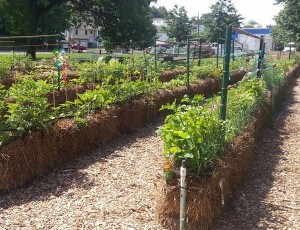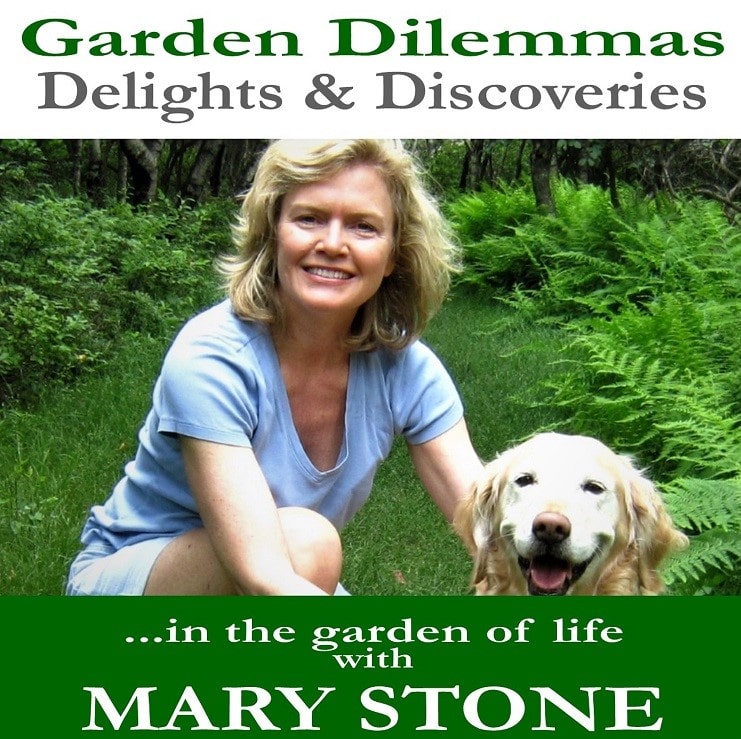Hello, fellow readers,
Thanks to Anita from Blairstown, NJ, who sent me an alert; I sat in on an informative talk about Vegetable Gardening Basics.
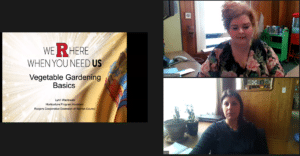 Kelly Durkin, Manager of Catherine Dickson Hofman Branch of Warren County Library, looking springy in a lovely floral dress, introduced Lynn Waclawski, the Horticultural Program Assistant for Rutgers Cooperative Extension in Warren County, NJ.
Kelly Durkin, Manager of Catherine Dickson Hofman Branch of Warren County Library, looking springy in a lovely floral dress, introduced Lynn Waclawski, the Horticultural Program Assistant for Rutgers Cooperative Extension in Warren County, NJ.
There’s always more to learn.
Before Lynn began, a questionnaire asked about our gardening experience level — beginner, intermediate, or expert. Most of us checked intermediate, though the talk served everyone. Frankly, I don’t know how anyone other than Mother Nature can be an expert gardener.
Another question was a preference for container versus in-ground gardening. While planning a vegetable garden for the first time here, I leaned towards in-ground gardening, my old tried and true. However, after the talk and learning that raised beds often incur fewer pests and weed dilemmas, I have reconsidered.
Raised beds can be many things.
Raised beds can be many things, including containers or using strawbales. Be sure if you’re using wood to create raised beds, it’s not treated with chemicals such as wood used for decks.
Straw bale gardening is ideal if you have limited space— a topic I wrote about six years ago (link below). The strawbales, not haybales riddled with seeds, require pretreating with nitrogen-rich fertilizer three weeks prior, plus supplemental fertilizing during the growing season. Lynn mentioned you could garden on concrete or pavement, which I hadn’t considered.
The basics of planning a vegetable garden:
Lynn covered the basics of planning a garden —the number of people you are growing for, the need for a water source, six to eight hours of sunlight daily, and critter controls. “Keep in mind deer can jump up to eight feet from a standing position.”
I plan to install wire deer fencing (8 feet high) around attractive posts, adding welded wire mesh to the bottom two feet, burying twelve inches below the surface, and bending another foot into an L-shape extending outward.
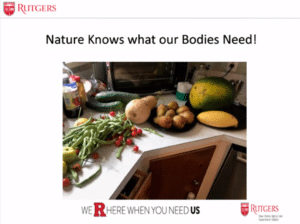 “Nature knows what our bodies need!”
“Nature knows what our bodies need!”
“Think about what’s growing at what times of the year,” Lynn said, suggesting we try to eat with the season. One of the most significant benefits of veggie gardening is knowing where your food is coming from.
It was a wake-up call for me having a blueberry addict in the house. “It causes blueberry stress,” I kid each time I shop. As of late, they’ve been readily available, traveling thousands of miles to get here. I’ve been eating them, too, but after the lecture, I’m abstaining from the habit, knowing they are likely packed with chemicals to preserve their shelf life. Never mind the pesticides and unknowns, such as whether sludge is used to fertilize in their country of origin.
Soil testing is of utmost importance every two years.
“Ph is the key to unlocking the nutrients in the soil.” Like people, if plants have all the nutrients needed, they will grow stronger and resist disease. Most vegetables prefer a Ph of 6-7. Contact your local extension office to request a soil testing kit for only about $20.
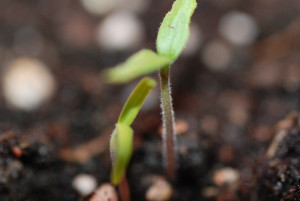 Seed packs provide the details of how to plant, thin, and space them properly, as overcrowding encourages fungus. Rotating vegetables, especially nightshades such as eggplant, peppers, potatoes, and tomatoes, is vital as they are more prone to diseases. Nightshades shouldn’t grow in the same soil for at least four years.
Seed packs provide the details of how to plant, thin, and space them properly, as overcrowding encourages fungus. Rotating vegetables, especially nightshades such as eggplant, peppers, potatoes, and tomatoes, is vital as they are more prone to diseases. Nightshades shouldn’t grow in the same soil for at least four years.
Throughout the talk, Lynn referred to Rutger’s helpful tools, such as a seed catalog list, pest controls, weed ID, and gardening fact sheets (links below).
She wrapped up the talk, encouraging us to ask her questions, adding, “I especially like garden dilemmas I don’t know the answers to because I learn something too.”
I smiled when she said garden dilemmas. Isn’t that what life is all about; Growing from the lessons of dilemmas, delights, and discoveries in the garden of life?
Garden Dilemmas? AskMaryStone@gmail.com (and now on your favorite Podcast App.)
Post updated 2/25/24
Link to the post on Straw Bale Gardening Builds Community featured in the Garden Dilemmas Podcast (@10 soothing minutes):
Rutgers Cooperative Extension Helpful Tools:


